Even career-driven, independent and intellectual women are familiar with the complex pressures that come along with eating (or not) and dieting (or not). We may know better. We may recognize how unhealthy it is to fixate on weight ("It's completely relative." "It's just a number."). We may be the first to condemn the latest diet craze.
And yet, unless you're one of the lucky few, you've battled with body issues at one point in your life. And if you're one of the many, you're probably battling body issues right now. The fixation is as real as it is rampant.
Thankfully, a new movement of nutritionists and wellness experts has begun sounding off, and Isabel Foxen Duke might just be the loudest among them. As a proponent of the Intuitive Eating model, she's helping women everywhere redefine their relationships with food. Her goal? To get us all to finally stop thinking like dieters.
Isabel's work isn't about judging what you eat—there's no "bad" or "good" food here—and it's definitely not about hitting some sort of ideal weight. For Isabel, a healthy relationship with food means a relationship without shame, guilt, or rules. It's about tuning into our bodies, just like we tune into our families, careers, and lives. She's building a new kind of empowered women's movement, one day at a time (with a lot of real talk and witty commentary along the way).
Isabel's work keeps her moving, to say the least. If she's not sharing her insight on podcasts or Refinery29's Anti-Diet Project, she's probably running a private coaching session, or maybe she's working on her video series Stop Fighting Food. Her regular newsletter, too, provides helpful reminders that keep you on a mindful, sane track. It's a career and business built on Isabel's core values with one goal: to find a way to help women stop feeling crazy around food.
Her Starting Point
Your work in health and wellness stemmed from your own struggles with food, which started when you were three (I’m always shocked when you say this) and lasted until you were 24. Can you talk a little about those formative years and how they led you to your work today?
I think I originally wanted to work in health and wellness for the wrong reasons—mainly because I was looking to fix myself, not because I had a solution that could legitimately help others. I think this is, unfortunately, common for coaches, therapists, nutritionists, etc. They go into the field looking to fix themselves, and their work ends up being the blind leading the blind.
Thankfully, I never worked with clients when I was struggling with food. In fact, I was working in marketing when my relationship with food actually started to change, and I started to get ahold of some real “solution.” At that point, I never thought I would work with people directly, but my blog—which cataloged my thoughts and experiences as my relationship with food was transitioning—took off, and readers started asking me for help. That was the beginning of my business.
Your educational background is as diverse as it gets, from getting your BA at Tufts to studying in Japan and Indonesia. What were some of the benefits you got out of mixing formal education with less “formal” programs?
I credit the vast majority of my success to my having studied Sociology at Tufts—mainly because it allowed me to challenge the status quo in an industry that is largely failing us when it comes to food and weight issues. I think Sociology should be required coursework for everyone in every industry because it forces you to think outside the box and challenge your own assumptions. My experiences studying Buddhism and some Eastern Philosophy were similarly helpful, particularly when it comes to mental health. But I literally don’t think there is a field out there that couldn’t benefit from some deep sociological analysis.
Let’s talk post-college jobs and internships. What were some of your first gigs, and what did you learn from them that you couldn’t have learned in school?
My first job out of school was a junior analyst position at a hedge fund. It really challenged me as it worked parts of my brain (and soul) that I hadn’t really worked before. I often tell people that I learned how to work when I was working in finance. There’s no room to fuck around, and when you’re asked to do something you don’t understand, your job is to just figure it out. It was incredibly challenging mentally, emotionally, and otherwise, but it also boosted my confidence in a strange way. I left that job feeling like there wasn’t anything I couldn’t handle if I needed to—and that’s a priceless feeling.
Doing what you do required veering from the traditional career path and the stability of a 9-to-5. You basically carved out your own niche. Did you always know you wanted to work for yourself?
I did fantasize about entrepreneurship when I was younger, but I had mostly given up on the idea as I got older for lack of “good ideas.” In my opinion, you can’t really control when and if a business-worthy self-employment opportunity comes along, just like you can’t always control when any other kind of job comes along. In many ways, my business fell into my lap.
That being said, I’m very aware that my business could never have happened had I not earnestly pursued my authentic interests and had the courage to take appropriate risks when necessary. I’ve heard people say that business is half waiting for good opportunities to come along and half be willing to take them—and I think there’s a lot of truth to that.

Her Big Break
Tell us about launching your program, Stop Fighting Food. Did the idea evolve naturally out of your daily work? How do you think it makes a difference?
Stop Fighting Food was a very intentional creation—it was the obvious next step after my audience grew to a size where I could no longer support people through private coaching. There are only a certain number of hours in the day and only so many people who I can help one-on-one, so I knew I needed to create some sort of online program that was scalable and could help the growing numbers of women struggling in their relationship with food.
There are a lot of online courses that claim to heal binge eating and emotional eating in particular, but I think Stop Fighting Food was one of the first to offer a truly body-positive approach to healing these issues. Most other programs miss the fundamental point that binge eating and emotional eating are inherently linked to dieting and body shame. They can’t be solved if the client remains obsessed with weight loss as a goal.
Did you make any mistakes as you learned how to run a full-time platform?
I’ve made a ton of mistakes, but generally only mistakes I could afford to make. I took my business slow, and to this day I try to keep it as simple and manageable as I can, so if something goes wrong, I can handle it. As my business gets bigger, and naturally more complicated, I’m even more convinced that keeping things as simple and straightforward as possible is a key to long-term success. Of course, good business practice is about being willing to take risks—but it’s also about being willing to risk-manage.
Obviously, no day is typical when you run your own business, but can you give us a sample of what a work day might look like?
My business is very seasonal, depending on whether or not I’m launching a program, prepping for a launch, or enjoying some downtime after a launch. Right now I’m kind of in between enjoying some downtime and prepping for a launch. I’m gearing up for some serious prep action (mainly writing content for an upcoming program), but I’m not so stressed out that I won’t go to a midday yoga class if I feel like it.
I’m also training a new office manager right now which is always time and energy consuming. Handling employee turnover is like handling a medical emergency for a small business—everything stops so you can get this one critical part of your business back to functioning the way it should.
Your brand is you, Isabel Foxen Duke. You’re constantly in public view whether you’re interviewing with Refinery29, speaking on a podcast, or the face of your new video series. What’s it like getting having such a public persona? How do you make sure that, as your business evolves, you stay true to your brand and yourself?
Because my business started with a very personal blog that I never thought would be seen by anyone, I definitely think I have a bit of an advantage in my willingness to be authentic in my brand. I’m very aware that many people read and trust me because I’m willing to say what most people are afraid or embarrassed to say, so I try not to shy away from that even when I’m challenged by it.
That being said, I do struggle in my attempts to say exactly what I want to say (no matter how radical, new, or countercultural it may be), without alienating those people who may not be ready or comfortable hearing it. A lot of people don’t want to face how they’ve been lied to by the diet industry about their prospects for permanent weight loss, for instance, or talk about how social punishments and privileges are distributed on the basis of size. Weight discrimination is a particularly uncomfortable topic for people, as it challenges one of America’s greatest-held cultural beliefs: that “thin is good” and “fat is bad.”
What’s the hardest part about what you do?
I think running your own business and having everything fall on your shoulders is inherently anxiety-provoking. Managing my emotional life in the context of my work is probably my greatest ongoing challenge.
I would say this is especially true when doing creative work. Creative work doesn’t thrive under pressure, so you’re always managing this catch-22 of trying to trick yourself into believing there’s no pressure, even when your lizard brain knows there totally is. Everything is mindset. Getting that straight is the real challenge.

Her Perspective
How do you measure your success (your own but also your businesses)?
I’m definitely still figuring out how to define my own success. Five years ago, I would have thought that my life would be perfect based on the amount of material success I’ve already accomplished in my business, but it seems material success is a moving target. I think that’s something I’m personally grappling with in my life right now—the realization that the accomplishment of material goals only creates more material goals. It’s exhausting.
That being said, I took some of the “material-success-pressure” off of myself when I decided that my business is a success as long as growing numbers of people are healing their relationship with food through my work, and I have a roof over my head, food, water, and clothes that make me feel good. I no longer think success is something to accomplish, but rather something to wake up and keep doing.
Your intuitive eating philosophy centers on the idea that creating unfair “rules” (about when it’s OK to eat, what’s OK to eat, how one should eat, etc) warps our relationship with food. Do you apply that philosophy to rules in general and other aspects of life, like your career?
I definitely try to apply that philosophy to the rest of my life—I’ve found that hard and fast rules in business and life often backfire, or at least create unnecessary limitations. That being said, I think rules are addictive (in work, life, food, all of it). I think it’s human nature to try to control things and fit things into boxes of what we think they should look like. Trusting ourselves is a skill that takes many lifetimes to fully develop. Food was just the starting point for me.
Did you have any mentors along the way? What’s some of the best advice you’ve ever received? What about the worst?
I’ve had many mentors! Some for just five minutes—those people along my path that have given me invaluable nuggets of wisdom. And some I’ve never even met, but just heard speak on the Internet!
I think the best advice I’ve gotten is that “what’s best for your business” isn’t always what’s best for your soul—and ultimately, if you forget about your soul, your business isn’t sustainable. I’m paraphrasing here, but I think it’s something about knowing when to chill out on your business and take care of yourself. Otherwise, you’re gonna burn out/freak out/all the things.
The worst business advice is kind of the flip side: to just “follow your heart” with no regard to practicality. It’s a balance.
How do you strike a balance between time on and time off? Any particular ways you decompress?
I try to balance work and time off intuitively—meaning, I weigh the responsibilities on my plate at any given moment against how I’m feeling and what I need emotionally, and act accordingly.
I also try to pursue some semblance of a spiritual life as often as I can, which lately has meant meditation and a lot of Pema Chodron books (she’s a Tibetan Buddhist nun who’s really resonating with me right now). At other points in my life it’s meant everything from prayer, to yoga, to spiritual inquiries of my own devices. I need something to help me remember that life is about more than my external circumstances, and I need it on a regular basis.
And finally, what do you wake up looking forward to? What’s next for your career?
I’m looking forward to updating the content in Stop Fighting Food, which I’m doing for the first time since I launched in 2014. I’ll be launching a new set of videos in the fall, which is always exciting— and I’m generally excited to offer more diverse programs as time goes on. I think 2017 will be a big growth year for me, as that’s when my current program model will likely transition into something that can reach an even wider audience. Lots of stuff on the horizon but only so much I can disclose since most of it is in the idea phase right now!
You May Also Like
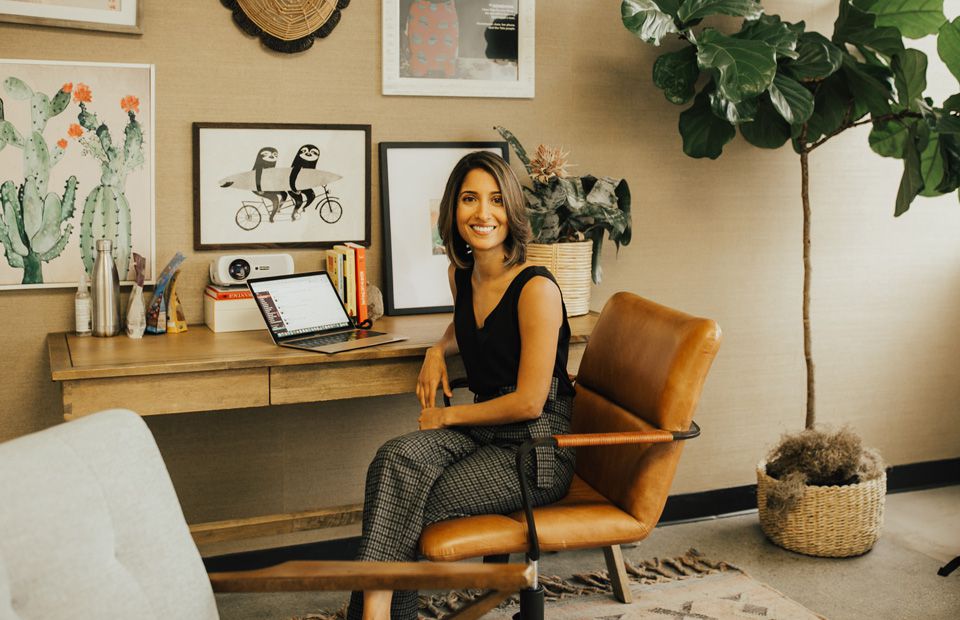
Technology
A Tech Founder on Why Being an Outsider Is a Strength
"I actually think most successful founders are rebels, of a sort. We’re trying to do new things and take on entrenched systems or ways of thinking. What makes me and our company different is that we’re outsiders."
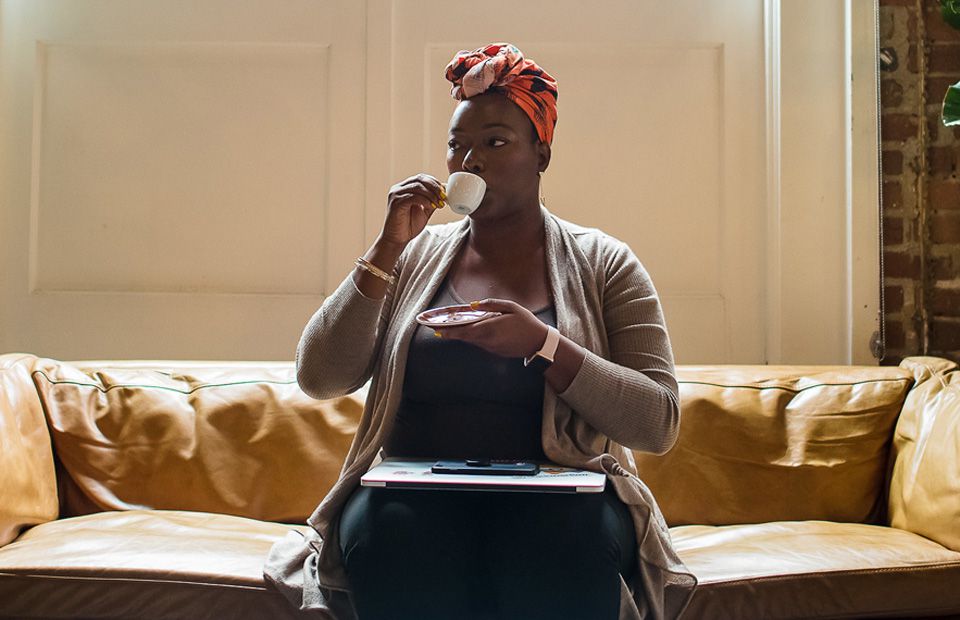
Technology
Omoju Miller—Tech Veteran, Leader, and Volunteer Advisor to the Obama Administration—on The Crucial Role of Creativity in the Tech Industry
"If you are in an environment where you feel marginalized, leave. Don’t try to change it. Go and look for a place that sees you and lets you be you."
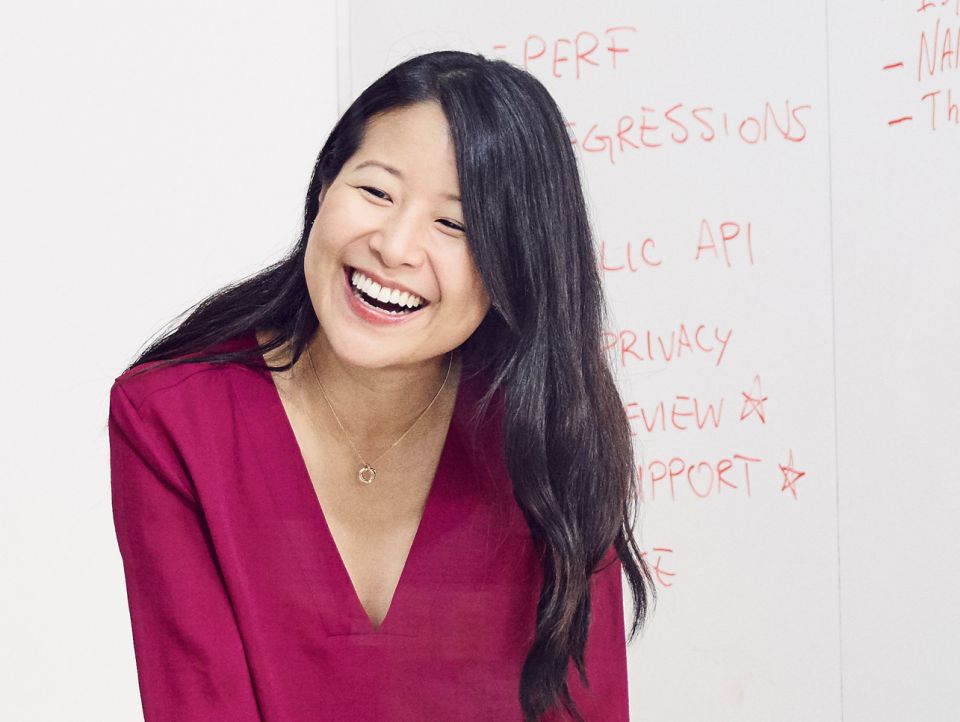
Technology
Sharing Stories as a Software Engineer
We sat down with Apple software engineer Emilie to learn about her day-to-day working at Apple along with what it takes to run the perfect meeting and her favorite ways to unwind.
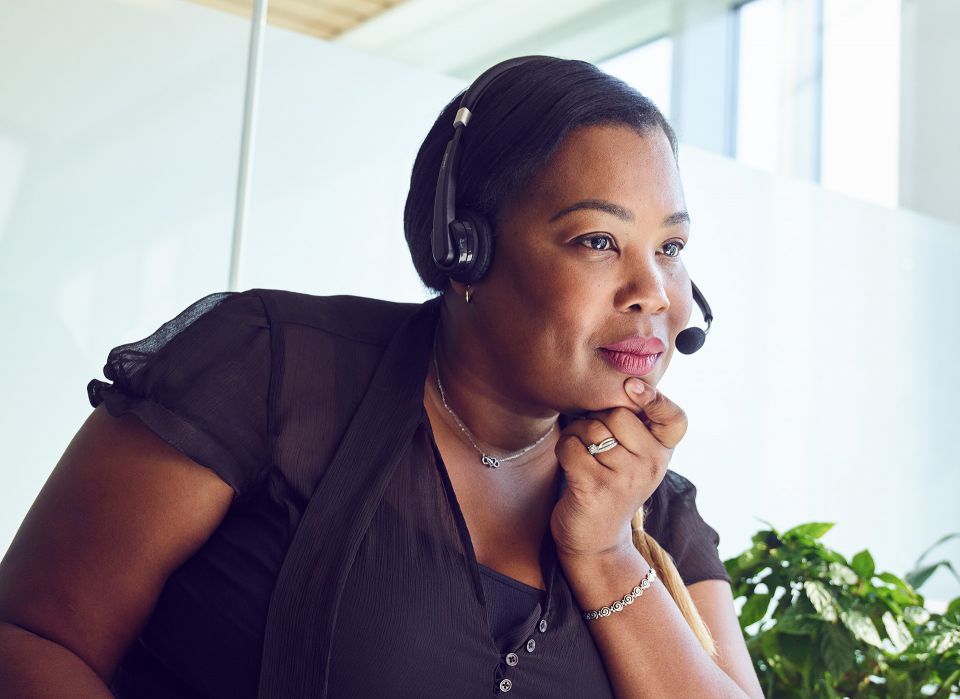
Technology
Creating Impact with Apple
We sat down with Apple's Senior Developer Partner Relations Advisor, Cris, to learn about what it takes to create a lasting impact within a large company. She shares a typical day in the life, her favorite book recommendations, and her top four tips to running a meeting.
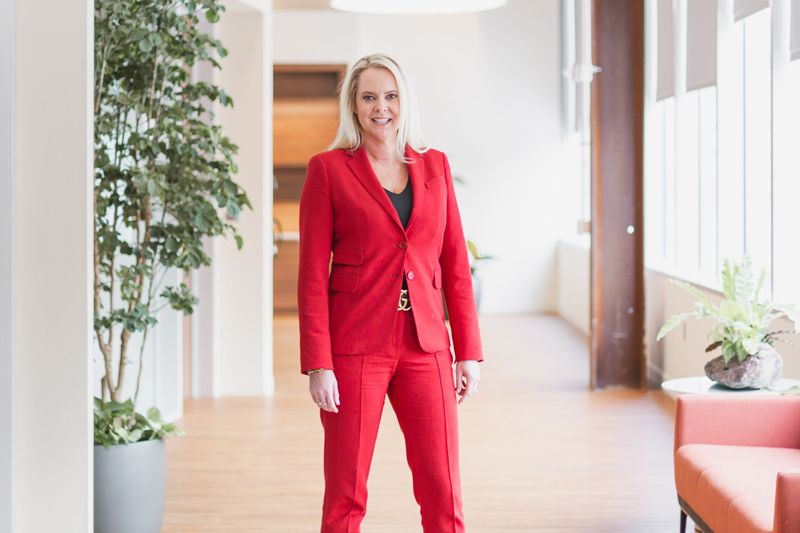
Technology
Salesforce’s Senior Vice President of Sales on Unconscious Bias, Failure, and Innovative Leadership
"Do not be afraid to fail, just bring your best self to the table."
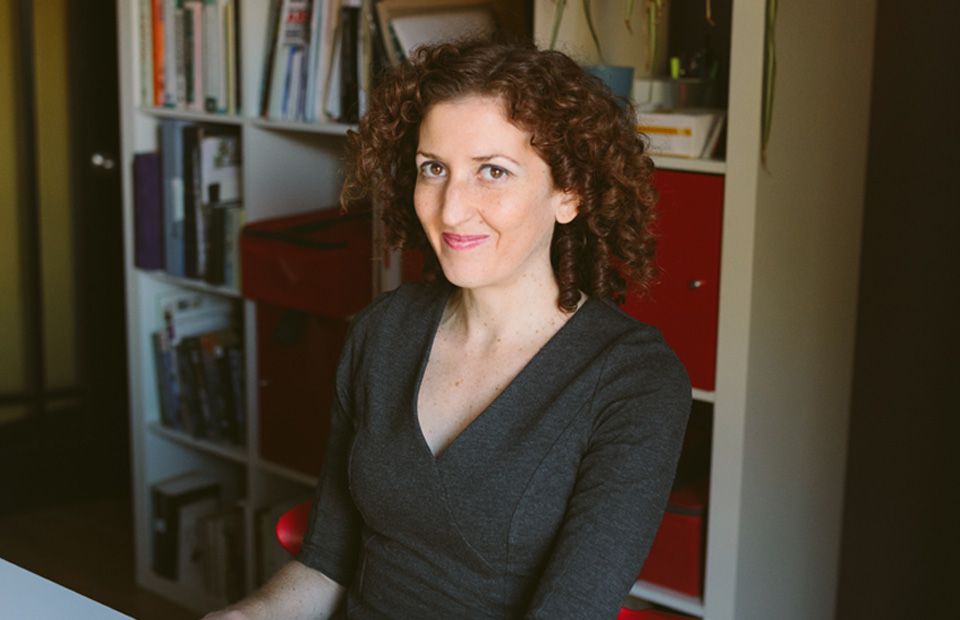
Technology
A Director of Engineering on Tech + Leadership
"I don’t believe in 'having it all'. If you spend more time on one thing, then you spend less time on another thing. All we can do is make choices on how to spend our time."
Get the Best Career Advice Delivered To Your Inbox
Join our newsletter to stay in the loop.
